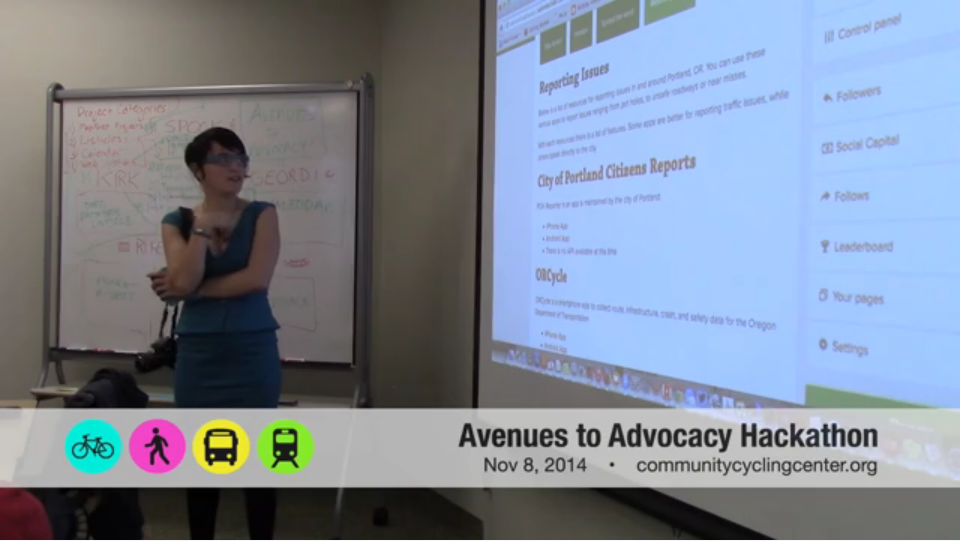DISCOVER YOUR LOCAL BICYCLING COMMUNITY
Find local advocacy groups, bike shops, instructors, clubs, classes and more!
Summit Big Idea: A Digital Advocacy Network

For Mychal Tetteh, the old adage proved true: Necessity is the mother of invention. Portland may be his hometown, but when he started as the Executive Director of the Community Cycling Center in 2013, he felt like he was working from a disjointed map, an incomplete playbook on how to make streets safer in his community.
“As soon as I got the job, I wanted to know everything,” he recalled. “From a regional standpoint, I wanted more complete information. I wanted to know who all the stakeholders were, a categorical list of all the advocacy organizations and agencies and neighborhood institutions.” He quickly discovered he wasn’t alone.
“In my first 60 days, as I talked to active transportation advocates even they weren’t positioned to know where to go, who to ask, when the meeting was and why it was important,” he said. “And these are people whose job, all or part of their day, is advocacy. Even they don’t have the information they need to be optimally effective. That’s a problem.”
A problem that Community Cycling Center decided to fix.
Avenues to Advocacy is a new, online tool that centralizes the type of information that advocates and everyday resident need to take action for active transportation. And we’re excited that Tetteh will presenting this Big Idea at the National Bike Summit in March.
I had the chance to chat with Tetteh last week, and he described Avenues to Advocacy as “a huge bit of network infrastructure that’s been missing in our ability to be effective advocates.” The new resource allows the bike movement to capitalize on the proliferation of data and the ability of technology to knit it together in ways that can increase public access and transparency.
Tetteh’s vision: “With this platform, I’ll be able to find relevant people; download or look at a curated calendar of everything related to transit, biking or pedestrian advocacy or other hashtags that are generated; see here’s everywhere the regional government is engaged or city government is engaged.”
“We’re considering it to be content clearinghouse and organizational kind of Facebook,” he added. “A tri-modal platform, where you can click on or click off functions that are relevant to you — and at the same time get challenged to engage outside of your silo. I can see it as a way that everyday people can connect on these issues and a platform that gives experts the opportunity to answer questions at once.”
At its foundation, that’s what Avenues is all about: Breaking down silos. It aims to build bridges, not only between transportation modes, but among organizations, government agencies and neighborhood groups. It cultivates the human infrastructure (hat tip to Adonia Lugo) and advocacy network that’s so critical to creating community change.
“Rather than trolling through the bottom section of commentary on a bicycle blog, which can be divisive, you can go into a demilitarized zone and get simple information from a tool,” Tetteh said. “And the target on this floats. It starts where the need is greatest — the active transportation advocates and organizations that are already engaged. That’s the low-hanging fruit. But I can imagine a tech savvy person in any community that’s been historically underrepresented using this and being on a level playing field with everyone else. The target floats from those we know want it to those most likely to need it as their opportunity to engage around active transportation.”
 But surely such tech solutions are far too costly and out of reach for a local nonprofit, right? Not when you use volunteers and convene collective efforts, like a hackathon, to make it happen. And, because it’s being built by the community, the team has been mindful that many low-income folks aren’t connecting to the internet on home computers. “We’re making sure it will be mobile friendly, because many people spend the majority of their screen time on mobile devices,” Tetteh said. Right now, the tool is about two-thirds complete — click the photo above to get an inside look from the recent hackathon — and Tetteh is confident that, even after its release, Avenues will be an invention that continues to grow and evolve in new and necessary directions.
But surely such tech solutions are far too costly and out of reach for a local nonprofit, right? Not when you use volunteers and convene collective efforts, like a hackathon, to make it happen. And, because it’s being built by the community, the team has been mindful that many low-income folks aren’t connecting to the internet on home computers. “We’re making sure it will be mobile friendly, because many people spend the majority of their screen time on mobile devices,” Tetteh said. Right now, the tool is about two-thirds complete — click the photo above to get an inside look from the recent hackathon — and Tetteh is confident that, even after its release, Avenues will be an invention that continues to grow and evolve in new and necessary directions.
“The information is increasingly available, the technology is increasingly approachable and we’re applying best practices as best we can within the niche of active transportation advocacy,” he emphasized. “Even if it just starts a conversation, people are going to realize something’s missing. If we don’t call it out, we won’t know it’s missing. Hopefully, we’ll be able to have an open source model that we’ll be able to share for other cities.”